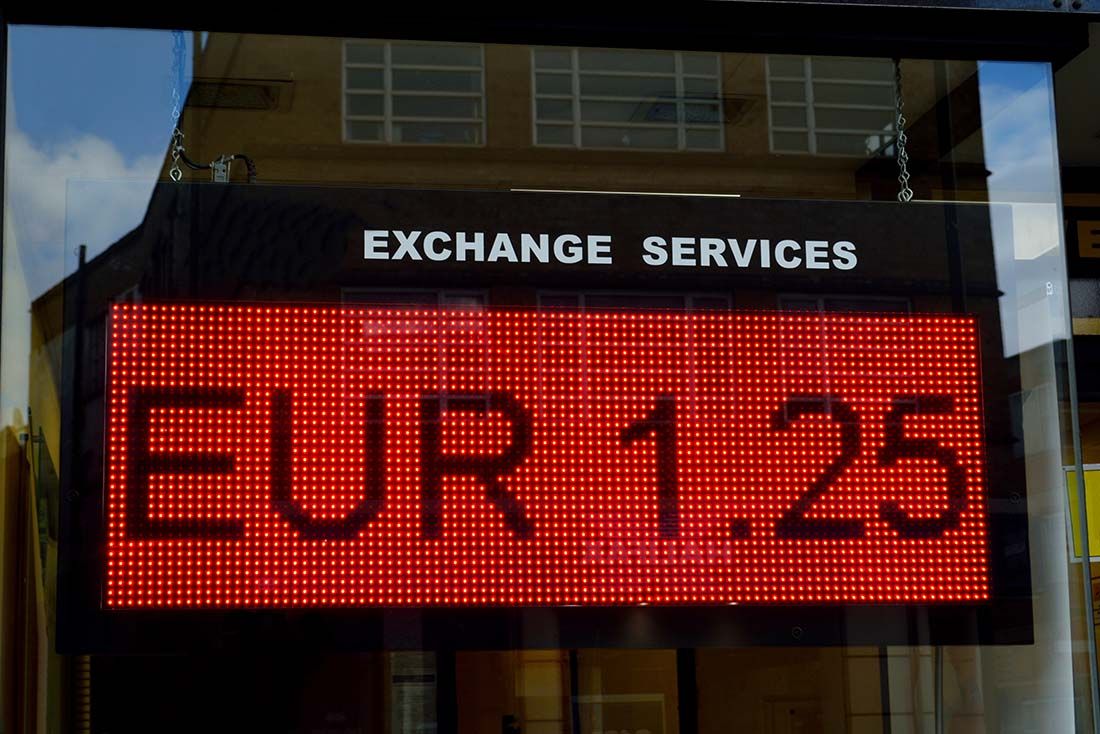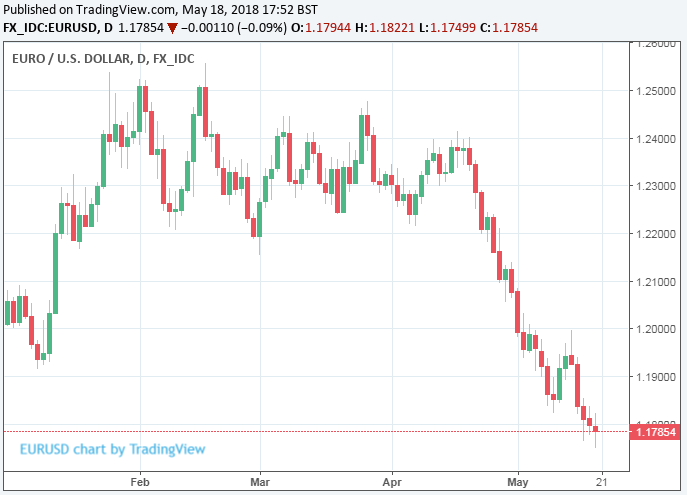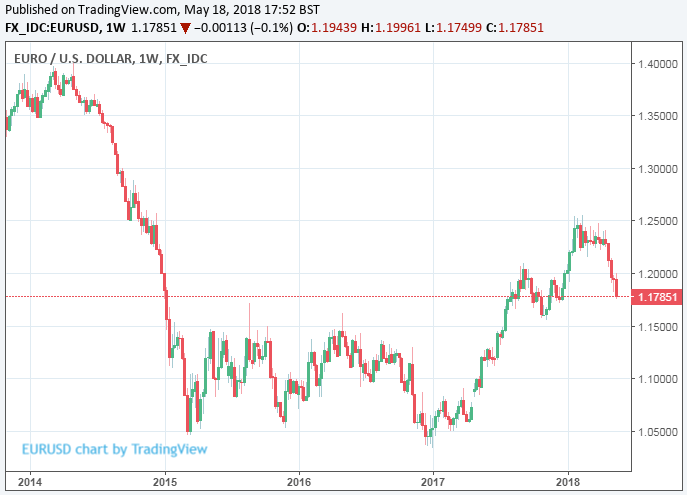EUR/USD Shunned by Analysts at Credit Suisse as Italian Threat to Single Currency Rises
- Written by: James Skinner
-EUR under renewed threat as M5S, League edge closer to power.
-End of austerity, policy clash with Brussels the minimum expected.
-EUR/USD to be avoided, just bet against EUR/CHF, say Credit Suisse.

© Savo Ilic, Adobe Stock
The Euro fell deeper into the red Friday as traders continued to contemplate the risks posed by the latest developments in Italian politics, which have led strategists at Credit Suisse to advocate that clients now avoid trading the Euro-to-Dollar rate an instead bet that the single currency falls in value relative to the safe-haven Swiss Franc.
Eurozone political risk is front-and-centre on the currency market agenda once again, now that Italy's two largest political parties are nearing an agreement that would enable them to form a government and details of their likely legislative programme were seen placing Italy on a collision course with Brussels while reviving old fears of a Eurozone breakup.
"The good news for EUR and GBP is that it's surely getting harder to deliver still more negative data surprises. The bad news is that Italy's political situation seems to be providing a fresh reason for at least euro area data to do exact that. Even EURGBP is starting to look heavy in this context, which is telling given the UK's own Brexit quagmire," Shahab Jalinoos, an FX strategist at Credit Suisse.
Above: Pound-to-Euro rate shown at daily intervals.
Documents leaked to Huffington Post Italy this week showed both League and Five Star Movement parties plan to ask the European Central Bank to forgive €250 billion of Italian debt acquired by the bank through its quantitative easing programme. They also revealed discussions have taken place about a possible push to reopen the European Union Treaties and insert a Euro exit clause, much like the Article 50 clause in the Lisbon Treaty that enables a country to exit the EU.
This would be an incendiary government agenda for markets that places a question mark over everything from the new government's commitment to honouring its debts, to the very survival of the Euro as a currency. In fact, fears over exactly this kind of agenda were what made Italy's March election and subsequent negotiations over forming a government such a big event for markets.
"While statements from party leaders Di Maio and Salvini rushed to assure markets that the Euro exit proposal is not in the updated draft of the government plan, markets are going to have a hard time shaking off the sneaky feeling that anti-EU sentiment provided the main common ground between two parties coming from radically different political and societal backdrops," says Jalinoos adds.
In addition to incendiary proposals for debt relief and a Euro exit, both of Italy's leading parties are committed to tearing up the Eurozone fiscal rulebook and rolling back post-crisis measures that have strengthened Brussels' ability to enforce clauses in the Maastricht Treaty requiring EU member states to keep their budget deficits beneath 3% of GDP.
They have also pledged to reverse a series of post-crisis pension reforms that are yet to be fully implemented. These saw the Italian budget deficit reduced but at a cost of a higher retirement age for many Italians and reduced levels of inflation protection.
"The risk of a populist Italian government actively looking for confrontation with Eurozone rules and institutions requires a political risk premium for the EUR, much like was seen in the period before the 2017 French presidential election. But it's also possible that the risk of Italian stresses hurts business sentiment across the euro area in coming months," Jalinoos writes, in a recent note.

Above: Euro-to-Dollar rate shown at daily intervals.
The Euro has fallen by close to 200 points against the Dollar since the details became public earlier this week, leaving it trading at a six-month low of 1.1783 and a year-to-date losss of -1.74%. This marks a reversal of what was a 4% gain barely more than a month ago. Similarly, the Pound-to-Euro rate has by more than 100 points to trade at 1.1440 despite broad weakness for the Pound relative to other developed world currencies during recent days.

Above: Euro-to-Dollar rate shown at weekly intervals.
Jalinoos and the Credit Suisse team argue that, despite the losses seen against the US Dollar and Sterling, not all of the bad news has been priced into the single currency just yet. They flag EUR/JPY and EUR/CHF exchange rates that still remain close to three-year highs, despite that both the Yen and Swiss Franc are both safe-haven currencies, as evidence of this.
"In the light of the long (and at the time perplexing!) lack of market reaction to the steady stream of poor news emerging from Italian politics, we see the balance of risks as asymmetrically more likely to generate a large EUR-negative reaction in the event of an announcement of a 5MS/NL government, rather than in a more benign scenario," Jalinoos warns.
While the M5S and League parties are yet to form an official government, support for them is still rising, particularly for Matteo Salvini's League party. League garnered 17% of the vote at the March election but a recent Demos/Repubblica poll placed the party on 25% support at the end of April. M5S remains the largest party and increased its vote share from 29% to 32% in the same survey. This, and the parties' policy platforms, raises another problem for the Euro.
"This could then lead to questions being asked about whether the ECB really will be ready to provide the market with more concrete forward guidance on its tapering and eventual rate hike plans at meetings in June or July as the market wants to see. If Italy becomes a reason to delay, the EUR can suffer for that reason too beyond the political risk premium aspect alone," says Jalinoos. "We will stay clear of buying EURUSD for now, despite decent long-term trade location. And we actively wish to be short EURCHF."
Advertisement
Get up to 5% more foreign exchange by using a specialist provider to get closer to the real market rate and avoid the gaping spreads charged by your bank when providing currency. Learn more here.




